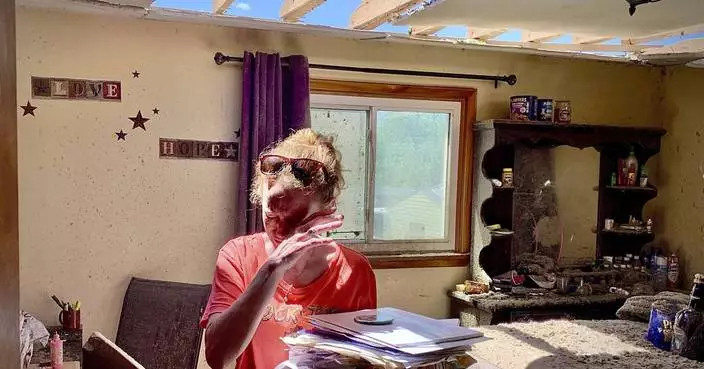The last time Tanna Jo Fillmore talked with her mother, she was in a Utah jail, angry, pleading and desperate. She'd called every day that past week, begging for help.
I need my medicine, she demanded.
I have to get out of here! she screamed.
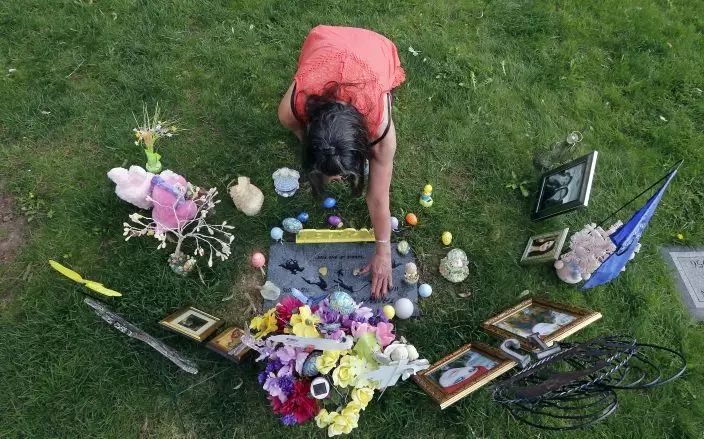
Melany Zoumadakis arranges photos and flowers that she brought to the grave of her daughter, Tanna Jo Fillmore, on April 26, 2019, in Salt Lake City. Fillmore killed herself in 2016 while being held on a probation violation. She had threatened to harm herself after she told her mother she was being denied her prescription medicines. Her mother has filed suit. (AP PhotoRick Bowmer)
Fillmore was in the Duchesne County Jail on a charge of violating probation in a drug case; she had reportedly failed to report a change of address. At 25, she'd struggled with mental illness for years, but Xanax and hyperactivity medication had stabilized her. Now, she told her mother, the jail's nurse was denying her those pills — and she couldn't take it any longer.
That November day, she phoned her mother, Melany Zoumadakis, three times over an hour. In their final conversation, Fillmore's voice was raw with rage. She blamed her mom, a nurse herself, for not doing more. She threatened to kill herself, warning that if she did: "'You're going to be the worst mother in the world.'" Then she hung up.
Zoumadakis called her daughter's probation officer and told him she feared her daughter would die in jail, but he assured her Fillmore was being monitored.
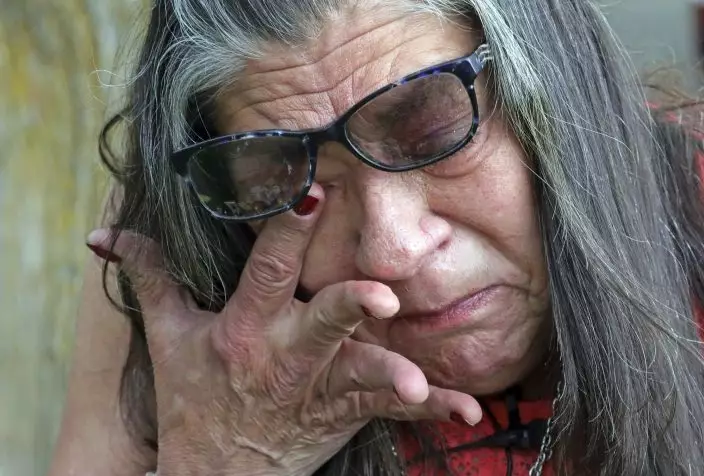
Melany Zoumadakis wipes a tear while visiting the grave of her daughter, Tanna Jo Fillmore, on Friday, April 26, 2019, in Salt Lake City. More than two years after her daughter's suicide, her mother says she still grieves and thinks about her constantly. Fillmore told her mother she desperately needed her prescription medicines, but a jail nurse wouldn't provide them. Her mother has filed sued. (AP PhotoRick Bowmer)
The next day, Thanksgiving 2016, Fillmore's sister, Calley Clark, received a Facebook message. "I'm so sorry," a friend wrote. Then another note arrived: "Please tell me it isn't true." In Texas for the holiday, Clark had an uneasy feeling and asked her boyfriend to call the jail. He returned with the news.
Clark dialed her mother, gasping so hard she could barely speak, and asked if she'd talked with Tanna that day. She hadn't.
"Mom," she cried, "she's dead!"
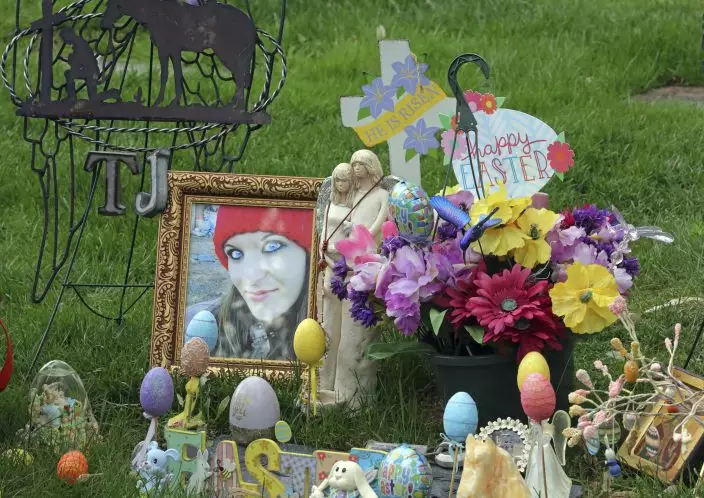
An arrangement of photos, flowers and Easter eggs surrounds the grave of Tanna Jo Fillmore on Friday, April 26, 2019, in Salt Lake City. Fillmore, who had a history of mental problems, killed herself in Duchesne County jail in 2016 while locked up on a probation violation. She told her mother she was being denied her prescription medicines that had stabilized her. (AP PhotoRick Bowmer)
On her ninth day in the Duchesne County Jail, Tanna Jo Fillmore hanged herself in her cell. She never did get her meds.
Read the headlines on any given day across America and you'll find evidence of a crisis roiling the criminal justice system: "Suicide leading cause of death in Utah jails." ''San Diego County inmate suicide rate 'staggeringly' high." ''Attempted suicides at Cuyahoga County Jail tripled over three-year span."
Stories like Fillmore's have been told time and again, and yet the deaths continue in jails large and small.
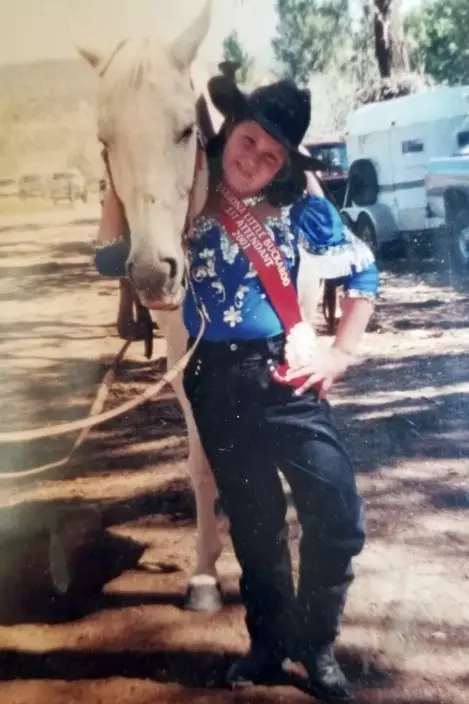
This undated photo provided by the family in 2019 shows Tanna Jo Fillmore as a girl. Jo-Jo or TJ, as her family called her, competed in rodeo barrel races while growing up in Utah. Fillmore, who had a history of mental problems, killed herself in 2016 at the Duchesne County Jail. Her mother, who has filed suit, says her daughter was denied her prescription medications and had threatened to harm herself when they spoke the day before her death. (Courtesy Melany Zoumadakis via AP)
Suicide, long the leading cause of death in U.S. jails, hit a high of 50 deaths for every 100,000 inmates in 2014, the latest year for which the government has released data. That's 2½ times the rate of suicides in state prisons and about 3½ times that of the general population.
It's a problem commonly blamed on the mere fact that more mentally ill people are landing behind bars, a trend that started after state psychiatric hospitals began closing in the 1970s and promised alternatives failed to emerge. More recently, jails have been overwhelmed with those addicted to opioids or meth, many of whom wrestle with depression and withdrawal.
Increasingly, troubling questions are being raised about the treatment of inmates in many jails, possible patterns of neglect — and whether better care could have stopped suicides.
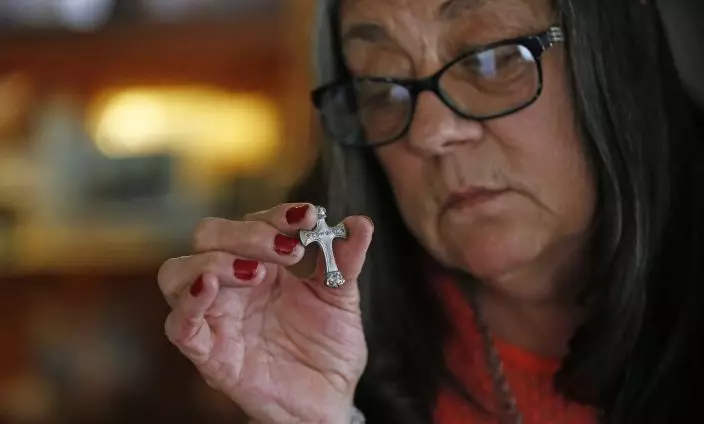
Melany Zoumadakis holds a crucifix while talking about her daughter, Tanna Jo Fillmore, at her home on Wednesday, April 24, 2019, in Salt Lake City. Fillmore, who had a history of mental problems, killed herself in 2016 at the Duchesne County Jail in Utah. Her mother, who has filed a lawsuit, says her daughter was denied her prescription medications and had threatened to harm herself when they spoke the day before her death. (AP PhotoRick Bowmer)
A joint investigation by The Associated Press and the University of Maryland's Capital News Service finds that scores of jails have been sued or investigated in recent years for allegedly refusing inmates medication, ignoring their cries for help, failing to monitor them despite warnings they might harm themselves, or imposing such harsh conditions that the sick got sicker.
Reporters spent months examining hundreds of cases in local news reports, reviewing investigations of specific jails, and compiling a database of more than 400 lawsuits filed in the last five years over alleged mistreatment of inmates, most of whom were mentally ill. Some 40 percent of those lawsuits involved suicides in local jails — 135 deaths and 30 attempts.
The court files contain thousands of pages of allegations and valuable clues about how and why this problem persists. For example:
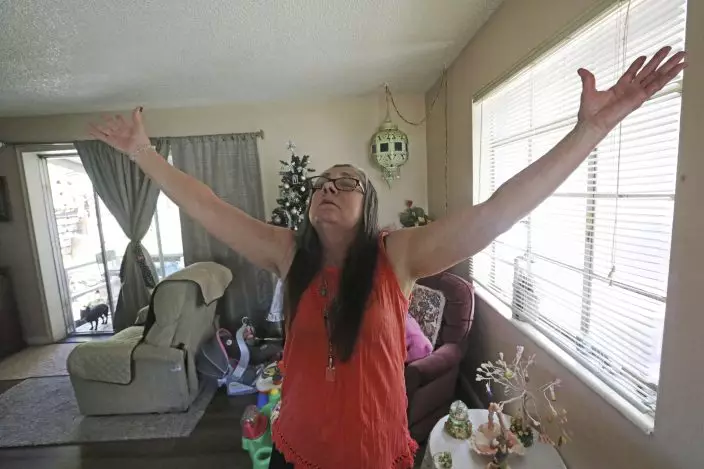
Melany Zoumadakis stands in her home Wednesday, April 24, 2019, in Salt Lake City, talking about the grief she has endured since the 2016 death of her daughter, Tanna Jo Fillmore. Fillmore, who had a history of mental problems, killed herself in 2016 at the Duchesne County Jail in Utah. Her mother, who has filed a lawsuit, says her daughter was denied her prescription medications and had threatened to harm herself. (AP PhotoRick Bowmer)
— About a third of jail inmates who attempted suicide or took their lives did so after staff allegedly failed to provide prescription medicines used to manage mental illness. Some jail officials say withholding medications for a short period isn't harmful and that some inmates try to manipulate the system to get drugs. David Mahoney, a Wisconsin sheriff, disagrees. If inmates are taking psychotropic drugs, he says, "we have a moral and ethical responsibility to continue them."
— The first week of an inmate's detention is critical. In the jail lawsuits, more than half of suicides or attempts occurred during the first seven days, and many of those were within the first 48 hours after intake. Those early days are marked by the sudden stress of confinement when inmates worry about losing jobs, family reaction and an uncertain future.
— Inmates frequently used clothing, bedsheets or shower curtains to hang themselves. The review also revealed instances of inmates being given razors, despite clear warnings they might harm themselves.
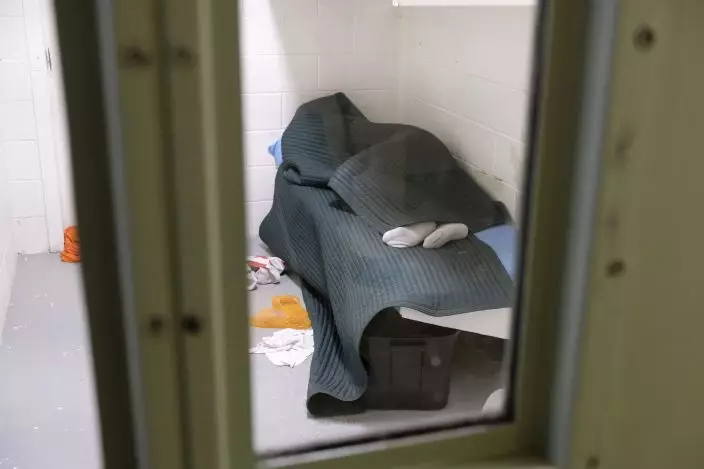
An inmate is shown covered in a tear-resistant blanket sleeps at the Lake County Jail in Lakeport , Calif., on Tuesday, April 16, 2019. These blankets were one of the many changes and reforms made at the norther California jail after a 2015 suicide there resulted in a $2 million wrongful death settlement. (AP PhotoEric Risberg)
— Many inmates weren't checked regularly — usually every 15-30 minutes — because of staffing shortages or inadequate training.
Of the 165 jail suicides and attempts, about 80 percent of inmates were awaiting trial.
These lawsuits represent a tiny fraction of the problem. An exclusive 50-state reporting effort to collect recent data found more than 300 suicides in local jails from 2015 to 2017 — in just nine states. The others did not provide numbers or offered incomplete data, an issue prompting some legislatures to consider bills that would require jails to provide better information about those dying behind bars.
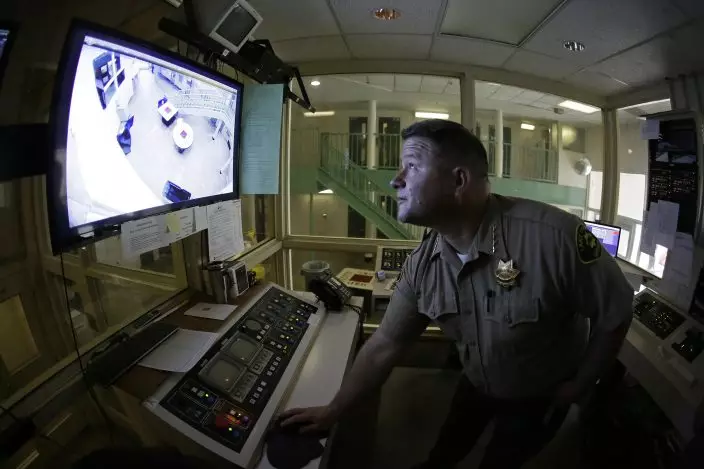
Sheriff Brian Martin looks at a video monitor in a control area of the Lake County Jail in Lakeport, Calif., on Tuesday, April 16, 2019. The sheriff instituted many reforms and changes, including a larger video surveillance monitor, following the 2015 suicide of a woman who had repeatedly cried for help. Her son's wrongful death suit resulted in a $2 million settlement. (AP PhotoEric Risberg)
The 2014 federal statistics reported 372 suicides among some 3,000 jails surveyed.
What's most disturbing about these deaths, lawyers and civil rights advocates say, is they're largely avoidable.
"The vast majority are foreseeable and preventable," says Lori Rifkin, a California prisoners' rights attorney. "But they continue to happen because, overall, I think there is a cultural dismissiveness toward both the signs that help us predict suicide — and toward the steps necessary to prevent them."
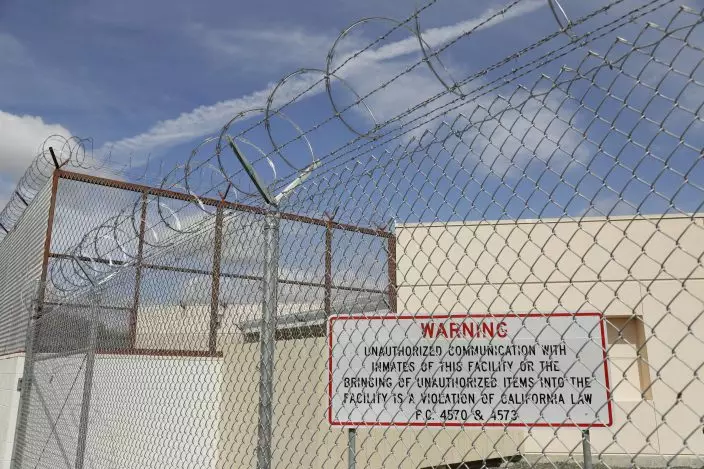
This Tuesday, April 16, 2019 photo shows an exterior view of the Lake County Jail in Lakeport, Calif. After a 2015 suicide at the jail resulted in a $2 million settlement in a wrongful death lawsuit, several changes were made, including adding a larger surveillance monitor, to prevent further tragedies. (AP PhotoEric Risberg)
Jonathan Thompson, head of the National Sheriffs' Association, calls that assessment absurd and says while jail officials must take every step to protect inmates, they've been placed in an impossible situation.
"We're not the nation's psychologists," he says. "We have decided that as a society let's just warehouse the mentally ill in a jail ... which is neither equipped for, trained to handle or able to be most efficient and effective at solving the problem.
"The failure here isn't just what a deputy or an officer in a jail does or doesn't do. The failure is that these people are being put in a criminal environment for mental illness."

In this Tuesday, April 16, 2019, photo, Emma Elwood, a nurse at the Lake County Jail in Lakeport, Calif., checks the vitals of a woman in the booking area. A series of changes, including adding a registered nurse, were made at the jail following the 2015 suicide of Elizabeth Gaunt, a former social worker who had repeatedly cried for help while locked in a cell. A wrongful death lawsuit resulted in a $2 million settlement. (AP PhotoEric Risberg)
Tanna Jo Fillmore had a troubled history.
Jo-Jo or TJ, as her family called her, was a fearless girl, competing in rodeo barrel races and riding her horses through the woods into the rugged Uinta mountains. Her mother dubbed her "the horse whisperer."
Problems started cropping up, though, during adolescence when she gained weight and classmates taunted her. She'd cry but would forgive. "She wanted to be accepted by everyone so much, even if they were mean to her," says her sister, Calley Clark.
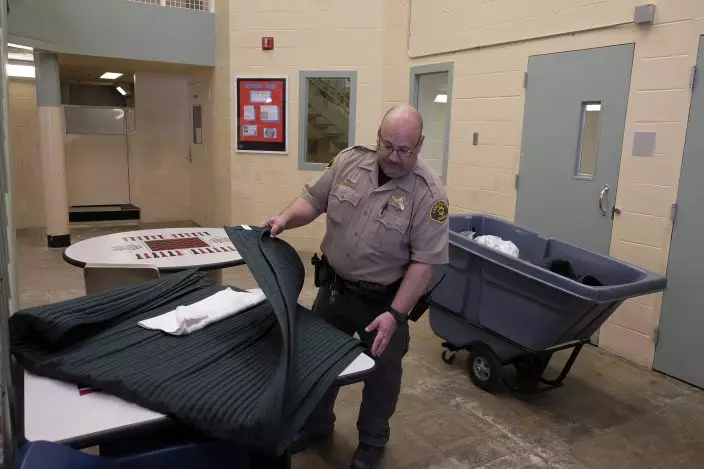
Corrections officer William Tinkler prepares to hand out tear-resistant security blankets at the Lake County Jail in Lakeport , Calif., on Tuesday, April 16, 2019. The blankets were part of a series of changes and reforms made at the jail following the 2015 suicide of Elizabeth Gaunt, who had repeatedly cried for help while locked in a cell. A wrongful death lawsuit resulted in a $2 million settlement. (AP PhotoEric Risberg)
Clark says her sister struggled with depression as a teen, but no one really addressed it. When Fillmore dropped out of high school just shy of graduation to care for her ailing father, Clark adds, "all her plans and dreams went away."
She was later diagnosed with post-traumatic stress, anxiety, panic disorder and depression, and was prescribed Xanax and the stimulant D-amphetamine sulfate, according to a civil rights lawsuit filed against Duchesne County.
Fillmore married at age 21, and around then, her family says, she started using methamphetamines and developed a reputation as a "druggie" in their tiny eastern Utah community, Tabiona. In 2013, according to court records, Fillmore pleaded guilty to drug charges and was placed on probation. Two years later, Clark says she still appeared to be using meth, though she flushed her drugs down the toilet and vowed to quit.
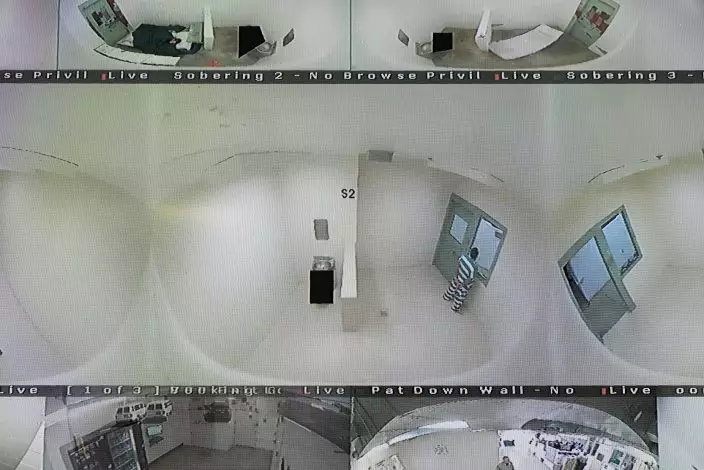
Surveillance cameras show holding cells seen on monitors in the booking area of the Lake County Jail in Lakeport, Calif., on Tuesday, April 16, 2019. At center is the holding area where a woman killed herself in 2015, leading to a $2 million settlement and a series of reforms at the jail. (AP PhotoEric Risberg)
By November 2016, Fillmore, long separated from her husband, had moved to Salt Lake City to live with her mother. She was talking about a fresh start and waiting for an open bed in residential drug treatment. The family's lawyer, Tyler Ayres, says Fillmore didn't report her change of address to her probation officer.
That led her to the Duchesne County Jail where, according to the lawsuit, she told the booking clerk about her prescriptions but, despite repeated requests, was denied them by Jana Clyde, a licensed practical nurse who allegedly called her a "drug addict." The complaint claims Clyde, who can't legally prescribe drugs, didn't "fulfill her gatekeeper role" by contacting the jail doctor.
Dr. Kennon Tubbs, who contracts with the county, told the AP he didn't receive any request for medication for Fillmore. Tubbs' physician assistant makes a weekly visit, but there's no indication Fillmore saw medical staff while locked up. Clyde did not respond to a message sent to her through the county.
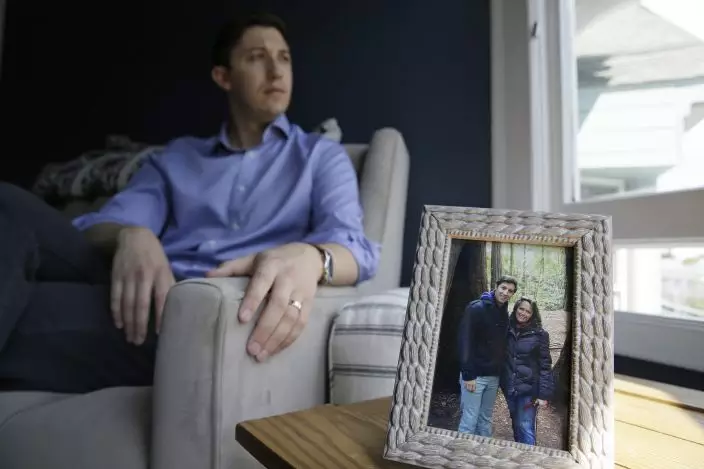
Dane Shikman sits by a photograph showing him with mother, Elizabeth Gaunt, at his home in San Francisco on Friday, April 19, 2019. Shikman's mother killed herself in 2015 at the Lake County, Calif., jail, after she was picked up for acting erratically. Gaunt, who had a history of mental health and substance abuse problems, had repeatedly screamed for help and pleaded to see a doctor. Her son’s wrongful death lawsuit resulted in a $2 million county settlement. (AP PhotoEric Risberg)
Ayres, the family's lawyer, says Fillmore wasn't suicidal and flourished while taking medication: "All they had to do was give it to her. ... They have an obligation to provide adequate medical care."
The lawsuit notes Fillmore also may have feared facing a lengthy sentence for her probation violation, although her court-appointed lawyer told the AP the chances of that were exceedingly low.
Fillmore hanged herself with a bedsheet. Her court hearing was four days away.

Dane Shikman stands by a photo showing where the ashes of his mother, Elizabeth Gaunt, were scattered in Ireland, while at his home in San Francisco on April 19, 2019. Shikman's mother, a former social worker with mental health and substance abuse problems, killed herself in 2015 at the Lake County, Calif, jail, after pleading to see a doctor and repeatedly begging for help. Her son's wrongful death t resulted in a $2 million county settlement. (AP PhotoEric Risberg)
Nationwide, jail suicide cases are leading to substantial settlements over faulty policies or neglect; some lawsuits were brought by families who'd tried warning jailers of a loved one's condition.
In Grundy County, Iowa, Jared Slinker, a 26-year-old mentally ill father of three, tied a bedsheet around his neck and was left hanging for 13 minutes because only one jail staffer worked that night and doubled as a dispatcher. Policy prohibited the guard from entering the cell until another worker arrived, says Dave O'Brien, a lawyer for the family, which last year won a $500,000 settlement.
Both Slinker's father and a doctor warned jail officials he was depressed and withdrawing from drugs. Slinker told a jail official he was delusional and taking an antidepressant, but the booking officer inexplicably answered "no" on an admissions form when asked about those very things.

Dane Shikman holds a rock from the beach where the ashes of his mother, Elizabeth Gaunt, were scattered in Ireland along with a pair of cufflinks she had made for him as he sits at his home in San Francisco on Friday, April 19, 2019. His mother, who had a history of mental health and substance abuse problems, killed herself at the Lake County, Calif, jail in 2015, after she repeatedly cried for help. Her son's wrongful death lawsuit resulted in a $2 million settlement. (AP PhotoEric Risberg)
"Any reasonable person would have not missed those signs that he was a mental health risk," O'Brien says, noting Slinker would have been monitored more carefully with the right classification. The jail has nearly doubled its surveillance cameras.
In Lake County, California, Elizabeth Gaunt, a 56-year-old former social worker, was jailed after acting erratically but never charged. Gaunt, who had mental health and substance abuse problems, was placed in a cell with a surveillance camera and was supposed to be checked every 15 minutes.
Over 25 hours, she begged for a doctor, repeatedly screamed "help me," tore a blanket into strips, checked their strength on a sink and toilet, and used them to kill herself. A guard who looked in through a cell window noted in an observation log all was OK.
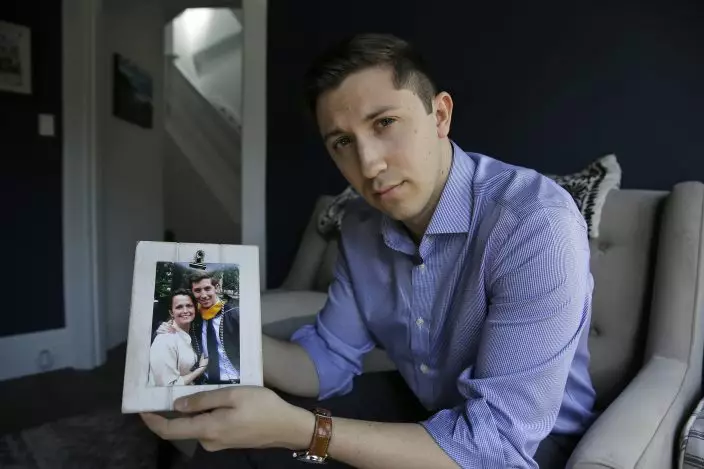
Dane Shikman holds a photograph showing him with his mother, Elizabeth Gaunt, at his home in San Francisco on Friday, April 19, 2019. Gaunt, a former social worker with a history of mental health and substance abuse problems, killed herself in 2015 in the Lake County Jail in northern California. Her son's wrongful death lawsuit resulted in a $2 million settlement. Changes also were made at the jail. (AP PhotoEric Risberg)
Dane Shikman, Gaunt's son, says his mother should have been taken to a mental health center, not jail, and believes the guards didn't care enough to intervene. The county settled a wrongful death lawsuit for $2 million.
"It is a failure of humanity and of our institutions that causes these tragedies," Shikman says. "When they see someone who looks like they're struggling, they don't say, 'Let me step in. This is someone's mom.'... They think this is a woman on drugs doing whatever she's going to do, she'll shut up."
In Delaware County, Pennsylvania, 35-year-old Janene Wallace, who suffered from mental illness and paranoia, was in solitary 51 of 52 days for a probation violation. She was locked up 23 hours a day at the George W. Hill Correctional Facility. When she threatened to choke herself in 2015, a guard told her to go ahead. She did. The guard went to lunch without checking on her and was among three workers fired.

This undated photo provided by the family in May 2019 shows Janene Wallace, who killed herself in 2015 in a Delaware County, Pa., jail. The 35-year-old Wallace, who suffered from mental illness and paranoia, was in solitary 51 of 52 days for a probation violation. When she threatened to choke herself, a guard told her to go ahead. The family won a $7 million settlement. (Courtesy Susanne Wallace via AP)
"She needed treatment," says David Inscho, an attorney for the family, which won a $7 million settlement. "They gave her the opposite."
Other cases detail how similar callousness or poor judgment can turn deadly: In Knox County, Tennessee, an inmate who tried to kill himself with a razor six months earlier was given another one when readmitted on theft charges. A guard allegedly said he should "have done the job right" the first time. The inmate slit his throat.
Sheriffs frequently complain they don't have enough money to hire mental health workers, train guards and make needed improvements to enhance inmate monitoring.
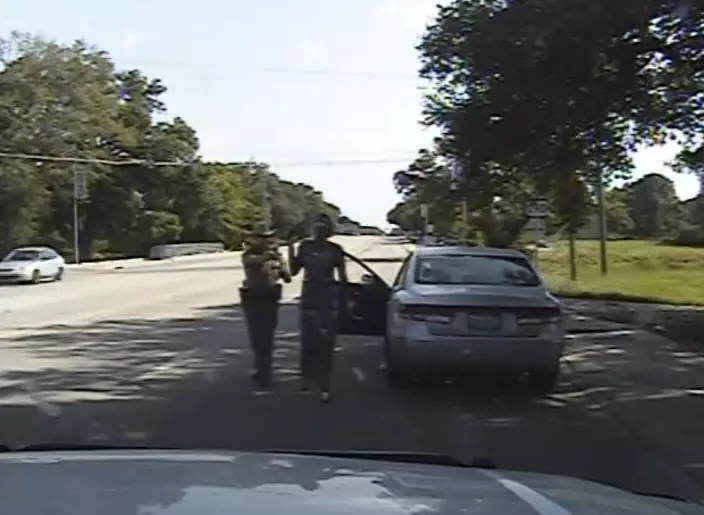
FILE - In this July 10, 2015 image made from dashcam video provided by the Texas Department of Public Safety, trooper Brian Encinia arrests Sandra Bland after she became combative during a routine traffic stop in Waller County, Texas. Bland was taken to the Waller County Jail that day and was found dead in her cell on July 13. (Texas Department of Public Safety via AP)
Mahoney, the Dane County, Wisconsin, sheriff, has no separate housing for inmates with certain severe behavioral, medical or mental health problems, so they're confined to solitary, where they'll spend 23 hours a day in a 6-by-9 cell with the lights on nonstop. "It's inhumane," he says. "But we're forced into a situation to keep these people alive."
Mahoney is trying to secure funding to replace a 66-year-old jail with one that will have a hospital-like wing. But seeking more dollars isn't a popular request.
"When ... we're answering to the taxpayers, do we want to say we're putting that money toward improving your roads, your schools ... or we're putting it toward making inmates more comfortable?" says Christine Tartaro, a criminal justice professor at Stockton University and author of "Suicide and Self-Harm in Prisons and Jails."
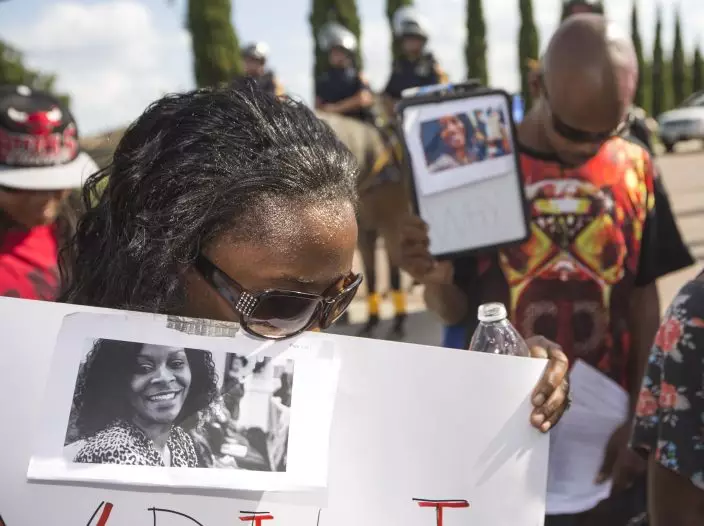
FILE - In this Sunday, July 26, 2015 file photo, Margaret Hilaire bows her head in prayer during a demonstration calling for the firing and indictment of Texas State Trooper Brian Encinia in Katy, Texas. Sandra Bland was found dead in her cell on July 13 in the Waller County Jail, just days after being arrested by Encinia during a traffic stop. Authorities determined through an autopsy that Bland hanged herself with a plastic bag. (Brett CoomerHouston Chronicle via AP)
The problem extends beyond budgets. Asking a jail to hold inmates awaiting trial and those serving short sentences, and also act as de facto mental health and drug treatment centers, she says, is too great a burden.
"How much," she asks, "are we expected to get out of one institution?"
Fillmore wasn't the first person to die inside the Duchesne County Jail.
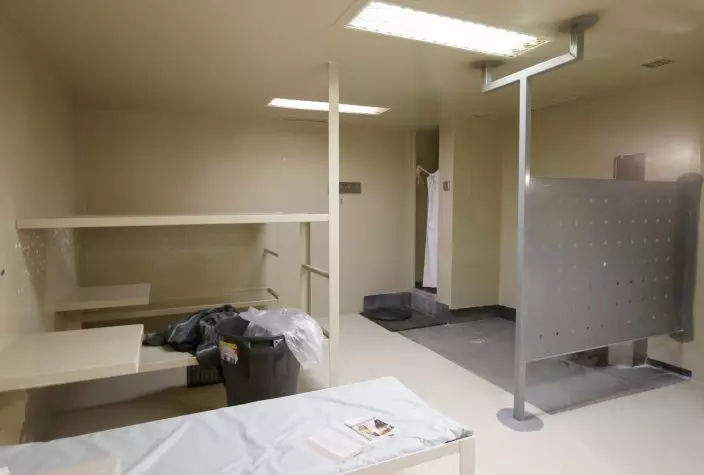
FILE - This July 22, 2015 file photo shows the Waller County jail cell in Hempstead, Texas, where Sandra Bland was found dead. In Texas, the Sandra Bland Act became law in 2017, mandating mental health training for law enforcement and making it easier for those arrested to receive a personal bond if they have a mental illness or substance abuse problem. Bland killed herself after being jailed for a minor traffic violation. (AP PhotoPat Sullivan, File)
Inmates killed themselves in 2013 and 2015, and a week after Fillmore's death, Madison Jensen, a 21-year-old withdrawing from heroin, was found dead in her cell. The cause: a probable cardiac arrhythmia caused by severe dehydration. She'd lost 17 pounds in four days, according to a lawsuit filed against the county, the sheriff at the time and jail officials including Clyde, the nurse in Fillmore's case.
Jensen, who'd been arrested on drug charges, was too weak to stand at times, vomited and had diarrhea repeatedly, the lawsuit says.
The Utah attorney general's office charged Clyde with negligent homicide. A magistrate threw out the case, but an appeals court reversed the ruling, paving the way for Clyde to face trial. The decision notes that other than checking on Jensen's blood pressure and giving her a sports drink, Clyde didn't take her vital signs, perform other tests or contact the physician's assistant even after Jensen filled out a medical request form.
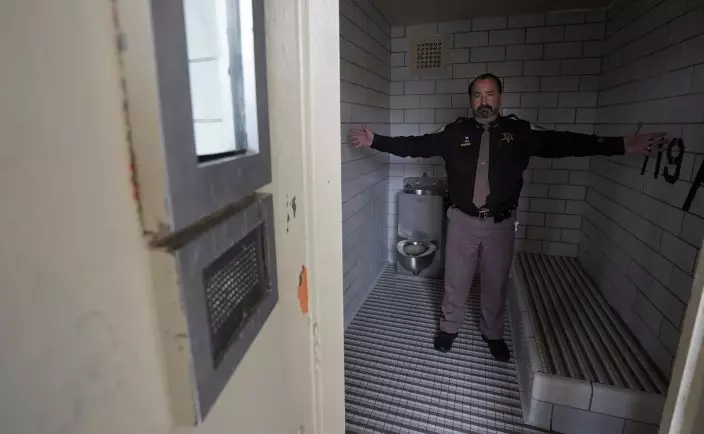
Dane County, Wis., Sheriff David Mahoney stands in a solitary confinement cell at the county jail. An advocate for the mentally ill, Mahoney says he sometimes has to lock certain inmates in these cells even though he calls the conditions "inhumane." Mahoney hopes to secure funding to replace the jail with one that will have a hospital-like wing. (AP PhotoMorry Gash)
Clyde told investigators she wasn't aware of the severity of Jensen's illness. Frank Mylar, her lawyer, says "based on the knowledge she had, she believed she did the best she could. After the fact, would she have done something different? Absolutely."
Duchesne County Sheriff Travis Tucker, who took office in January, declined to discuss either case but says jail policy does provide for some prescription medicines. He also says a seven-bed medical wing is being added to cope with what he estimates is a tripling of inmates in the last decade, many of them mentally ill or addicted. Registered nurses have been added, as well.
Tucker notes the state has a higher-than-average suicide rate, "so if it's that way on the outside, what makes you think it isn't going to be that way on the inside?" He's part of a statewide group exploring how Utah jails can better prevent suicides.
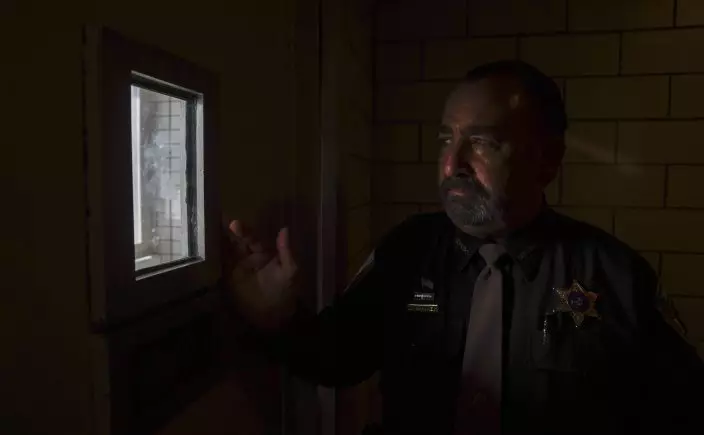
Dane County, Wis., Sheriff David Mahoney looks through a small window in a solitary confinement cell at the county jail in Madison. Mahoney says he has no separate housing for inmates with certain behavioral, medical or mental health problems, so he has to put them in these cells even though he says it's "inhumane. But we're forced into a situation to keep these people alive." (AP PhotoMorry Gash)
Last year, state lawmakers passed a measure requiring an accounting of jail deaths — a demand initially met with "a lack of cooperation" among some sheriffs, according to Sen. Todd Weiler, the sponsor.
But they did comply. In November, the Utah Commission on Criminal and Juvenile Justice reported 71 people died in Utah jails from 2013 to 2017. More than half — 38 — were suicides.
There's no single fix for this, but sheriffs, lawmakers and advocates have some possible answers.
Some jails have improved training, added mental health staff and placed suicide-resistant mattresses in cells.
In Lake County, California, where there was that $2 million settlement, Sheriff Brian Martin initiated reforms including installing a larger surveillance monitor for guards to watch cells holding troubled inmates. The jail also replaced blankets with tear-resistant ones; gave staff four more hours of suicide prevention training; added a registered nurse; and replaced paper logs with an electronic system to track cell checks. All jail clocks were synchronized, too, so inmates are monitored at the correct intervals.
"We don't want this to ever happen again," Martin says.
In Texas, the Sandra Bland Act became law in 2017, mandating mental health training for law enforcement and making it easier for those arrested to receive a personal bond if they have a mental illness or substance abuse problem. The measure is named after a black woman who killed herself in 2015 after being jailed in Waller County for a minor traffic violation.
Other Texas counties have implemented changes.
In Bexar County, home to San Antonio, 21 inmates killed themselves from 2011 to 2018. Now, a special team of deputies roams the jail to identify inmates who may be suicidal. The sheriff also is working with county officials to secure the release of nonviolent mentally ill inmates who may languish in jail because they can't afford a $250 bond.
In Harris County, home to Houston, the sheriff's office teamed up last year with mental health officials for a pilot program to give inmates access to a suicide hotline. "It acted like a pressure valve," says Sheriff's Major Mike Lee. The program is expected to become permanent.
"The solutions ... don't involve reinventing the wheel," says Aaron Fischer of Disability Rights California. His group spent 2½ years investigating San Diego County jails, where there were 17 suicides from 2014 to 2016, and issued a report criticizing the system for excessive use of solitary confinement and punitive treatment of the mentally ill. San Diego officials say they are investing resources into training and recruiting.
Fischer says it's important to demystify mental illness to a public that may mistakenly believe inmates who kill themselves are "wholly to blame" or deserve what happens to them if they end up in jail.
"These are people who had families, people who had dreams and strengths and weaknesses," he says, "humans placed in an extremely harsh and punitive setting and denied care that they needed, leading to a death that didn't need to occur."
Tanna Jo Fillmore had dreamed of rebuilding her life.
Five days after her death, her mother got a call from the residential treatment center her daughter had planned to enter. It was her check-in day, and the caller wondered why she wasn't there. Her mother relayed the news.
More than two years later, Fillmore's mother still grieves. On Easter she visited the cemetery, polishing her daughter's headstone, putting down flowers and propping up family photos. The tears flowed, as they do whenever she visits.
When she stopped crying, she stood at the grave and in a strong, clear voice spoke to her lost daughter:
"Dear Jo-Jo," she said, "we love you and we miss you and we think about you every single day. Keep dancing in the sky."











